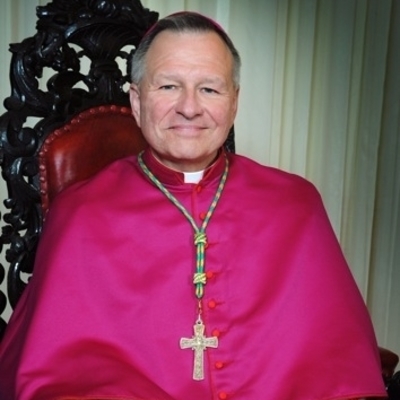
A platform that encourages healthy conversation, spiritual support, growth and fellowship

NOLACatholic Parenting Podcast
A natural progression of our weekly column in the Clarion Herald and blog

The best in Catholic news and inspiration - wherever you are!
We need to offer prayer and action for those affected by Ida
-

Could you give a brief overview of what you have seen during your post-Ida pastoral visits across the archdiocese?
There’s been just incredible destruction. In some areas, it would seem to me that this was equal to Katrina – with less flooding but terrible wind damage. All parishes in the archdiocese have been affected, but some have been severely affected, with multiple buildings damaged. But even more importantly and more urgently than that are the number of people who have lost their homes and who will be spending a great deal of time rebuilding their homes and, in some ways, their lives.
What do you talk about when you meet with people?
I keep hearing the word “resilient” – that we’re a very resilient people. And that’s very true. But I think it's more accurate to say that we are people of faith. I've heard that from so many people. They have told me that they have lost everything, but those are only material possessions. They have told me, “I still have my life, I still have my family, I still have my faith.”
What do you consider to be the archdiocese’s first responsibility when a natural disaster like this strikes?
We need to be there for people. Sometimes there's not much we can do but walk with them, but it's important to be able to do that. That's what Jesus would do.
There was a picture of you and other Catholic Charities staff members carrying the suitcases of some of the people who were leaving town on buses after the storm to get to a state shelter.
I believe it’s important to accompany people in their pain and uncertainty. That's the spiritual dimension of our response. That’s what the Lord Jesus calls us to do.
How have you been impressed by the response not only by clergy and religious but also by parishioners?
The clergy and the many people who work with them – in a particular way, the lay leaders in parishes – have gone above and beyond the call of duty. In all of the parishes where I’ve been, I've certainly met with the clergy, but the lay leaders have been equally bearing the burden of people's lives and their losses. We have worked very, very closely with our diocesan staff, especially with the staffs of Catholic Charities and Second Harvest Food Bank as we visited many sites. We have all worked very collaboratively.
Many church parishes have been sites for distribution of supplies and food.
We've opened all of our parishes to be available for that. Many of the contributions of food and supplies have come from local sources. We’ve even had trailer trucks from California coming here.
You also have to be mindful of the great damage in the Diocese of Houma-Thibodaux, which bore the brunt of Ida.
We've been talking to Bishop Fabre regularly. There’s no doubt that the hit was far greater in the Houma-Thibodaux area than it was in the New Orleans area. Bishop Fabre told me it’s been truly overwhelming for his people. I would say he has been hit in a similar way to the way in which Lake Charles was hit last year at this time by Hurricane Laura. It's overwhelming.
What can people do in response to support relief efforts?
I think the best way to do it is on the local parish level. We coordinate things through Catholic Charities and Second Harvest, but the ideal way to really contribute is on the local parish level. We are also taking financial contributions, and that will be used to buy food and supplies and help with the various needs that people have. The U.S. bishops have authorized a second collection for natural disasters that is taken up across the country, and they have underscored that a specific amount of it will be used for New Orleans and for Houma-Thibodaux.
When you see the intensity and the frequency of these storms, what goes through your mind?
It is scary. It makes us realize that we are certainly not in control of nature, and nature takes its normal course. Mother Nature can be very destructive and cause a great deal of pain and suffering in the lives of people. We need to be there to walk with people, pray with them and support them.
Questions for Archbishop Aymond may be sent to [email protected].




